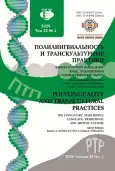Peculiarities of the Terminology of Weaving and Spinning in the Mari Language
- Autores: Peksheeva E.I.1
-
Afiliações:
- Mari Research Institute of Language, Literature and History named after V.M. Vasiliev
- Edição: Volume 22, Nº 1 (2025): THE FINNO-UGRIC MARI PEOPLE: LANGUAGE, TRADITIONAL AND ARTISTIC CULTURE
- Páginas: 39-48
- Seção: Language in System
- URL: https://journal-vniispk.ru/2618-897X/article/view/326868
- DOI: https://doi.org/10.22363/2618-897X-2025-22-1-39-48
- EDN: https://elibrary.ru/DXBXQL
- ID: 326868
Citar
Texto integral
Resumo
The paper is devoted to the study and identification of the features of the lexical fund associated with weaving and spinning in the Mari language and its dialects. These words are considered in terms of origin, semantics and word formation. This analysis is one of the necessary stages for a comprehensive study of craft vocabulary based on field data and lexicographic sources. In the materials received, vocabulary was highlighted, it was classified according to the system of thematic groups and subgroups. As a result of the study, it was established that in addition to words that coincide with the lexical units of the literary language, phonetic, lexical and semantic dialect words are found in the Mari language. The foreign language layer of the analyzed vocabulary is represented by borrowings from the Chuvash, Tatar and Russian languages. The need to study this topic is dictated by the low degree of knowledge of weaving and spinning terms in the Mari language and its dialects. The vocabulary of the subject group under consideration contains information about the material culture and economic activities of the Mari. Nowadays, spinning and weaving are a thing of the past, and with it the vocabulary associated with this type of activity disappears. The collection, systematization and comprehensive analysis of spinning and weaving vocabulary is therefore an important task for researchers. The paper uses descriptive, comparative-comparative methods and a method of structural-semantic analysis.
Palavras-chave
Sobre autores
Elvira Peksheeva
Mari Research Institute of Language, Literature and History named after V.M. Vasiliev
Autor responsável pela correspondência
Email: peksheevaelya@rambler.ru
ORCID ID: 0009-0004-3091-9189
Candidate of Philology, Senior Researcher
44 Krasnoarmeiskaya St, 424031, Yoshkar-Ola, Russian FederationBibliografia
- Filin, F.P. 1982. Essays on the theory of linguistics. Moscow: Science. Print. (In Russ.).
- Ufimtseva, A.A. 1968. Word in the lexical-semantic system of the language. Moscow: Science. Print. (In Russ.)
- Shmelev, D.N. 2017. Problems of semantic analysis of vocabulary. Moscow: Lenand. Print. (In Russ.)
- Kazantsev, D.E., and G.S. Patrushev. 1971. Modern Mari language. Lexicology. Yoshkar-Ola: Mari Book Publishing House, pp. 72–79. Print. (In Russ.)
- Bartseva, L.I., and I.S. Galkin. 2003. Kyzytse mari yylme. Lexicologies. Yoshkar-Ola: Publishing House. Print. (In Mari.)
- Trubachev, O.N. 1966. Craft terminology in Slavic languages (etymology and experience of group reconstruction). Moscow: Science. Print. (In Russ.)
- Kelina, A.N. 1996. Terminology of weaving in Mordovian (Moksha and Erzya) languages: Candidate of Philological Sciences Thesis. Saransk. EDN: ZJZLAJ Print. (In Russ.)
- Romanova, G.N. 1980. “Spinning and weaving terminology in the Komi language.” In Fenno-ugristica. Works on Finno-Ugric Studies — 6. Specific features of the vocabulary and grammar of the Ural languages. Tartu: Tartu State University, pp. 94–102. Print. (In Russ.)
- Titova, O.V. 2021. “Vocabulary of weaving and spinning in dialects of the northern dialect of the Udmurt language”. Philological sciences. Questions of theory and practice, vol. 14, pp. 49–52. https://doi.org/10.30853/phil201012 EDN: KUESTV Print. (In Russ.)
- Yangelova, M.S. 2007. “Terms of weaving in the dictionary Ӧ. Beke “Mari nyelvjárási szótár” (Tscheremissisches Dialektwörterbuch).” In Socio-cultural development of the Volga and Ural peoples in the XX — beginning XXI centuries. Yoshkar-Ola: Mari State University, pp. 47–49. Print. (In Russ.)
- Yangelova, M.S. 2008. “Vocabulary of flax and hemp processing, spinning and weaving in the Mari language.” Bulletin of the Chuvash University, no. 3, pp. 194–197. EDN: JZGHZR Print. (In Russ.)
- Kryukova, T.A. 1956. Material culture of the Mari of the XIX century. Yoshkar-Ola: Mari Book Publishing House. EDN: NJFPEK Print. (In Russ.)
- Mari people. 2018. Historical and ethnographic essays. Yoshkar-Ola. Print. (In Russ.)
- Molotova, T.L. 2004. Traditional Mari weaving. Yoshkar-Ola. Print. (In Russ.)
- Vasiliev, V.M. 1928. Mari Muter. Mari Dictionary. Moscow. Print. (In Mari)
- Mari-Russian dictionary. 1956. Moscow: State Publishing House of Foreign and National Dictionaries. Print. (In Mari, Russ.)
- Dictionary of the Mari language: 10 vol. 1990–2005. Yoshkar-Ola. Print. (In Russ.)
- Dictionary of the Mari language. Add. vol: A-Ya. 2019. Yoshkar-Ola. Print. (In Russ.)
- Ivanov, I.G., and G.M. Tuzharov 1971. Dictionary of the northwestern dialect of the Mari language. Yoshkar-Ola. Print. (In Mari, Russ.)
- Savatkova, A.A. 1981. Dictionary of the mountain dialect of the Mari language. Yoshkar-Ola: Mari Book Publishing House. Print. (In Mari, Russ.)
- Ilieva, A.A. 2009. Dictionary of the Baltach dialect of the Mari language. Yoshkar-Ola: Mari State University. Print. (In Mari, Russ.)
- Vershinin,V. I. 2011. Dictionary of Mari dialects of Tatarstan and Udmurtia. Yoshkar-Ola. Print. (In Mari, Russ.)
- Fundamentals of Finno-Ugric linguistics: Issues of the origin and development of Finno-Ugric languages. 1974. Moscow: Science. Print. (In Russ.)
- Fedotov, M.R. 1996. Etymological dictionary of the Chuvash language, vol. 2. (Sav–Yashtaka). Cheboksary: Chuvash State Institute of Humanities. Print. (In Russ., Chuvash)
- Fedotov, M.R. 1996. Etymological dictionary of the Chuvash language, vol. 1. (A–Rităvan). Cheboksary: Chuvash State Institute of Humanities. Print. (In Russ., Chuvash)
- Fedotov, M.R. 1990. Chuvash-Mari language relationships. Saransk: Saratov Publishing House, Branch of Saransk University. Print. (In Russ., Chuvash, Mari)
Arquivos suplementares









